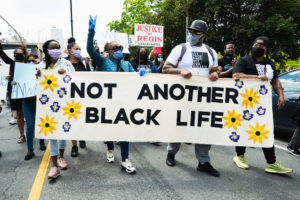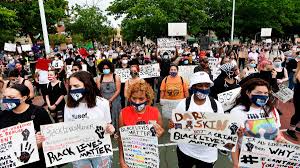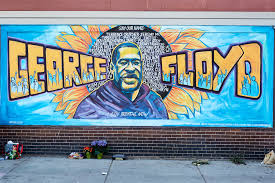Like many people, I was greatly relieved at the outcome of the trial of police officer Derek Chauvin, who was found guilty on all three counts for the murder of George Floyd last May. While, like many, I feared the worst – i.e. that Chauvin would be set free or there would be hung jury – I hoped that what the world watched – Chauvin sitting on Floyd’s neck for 9 minutes and 43 seconds – would be enough evidence to convict him. As I awaited the announcement of the verdict, I was struck by how almost every African American who was interviewed, both on the street and in the TV studio, did not believe Chauvin would be convicted. And even after the verdict was announced, while most people – Black and white – expressed relief and satisfaction – I was struck by how many African Americans stated that this was just one case of one police officer, and did not represent a significant change in police-African American relations. As Philadelphia Inquirer columnist Jenice Armstrong wrote, for many African Americans “Tuesday’s verdict is like a proverbial Band-Aid on a bullet wound.” As Armstrong went on to say the verdict was “a cause for exhaling – whoosh – but we’re not done.”
 Later Tuesday evening I was in conversation with a group of people who expressed that the verdict might signal hope for change. Likewise, many media commentators stressed that perhaps Chauvin’s guilty verdict would send a message to police precincts around the country. And yet minutes before Chauvin’s verdict was announced a troubled 16-year-old girl in foster care wielding a knife was shot and killed by officers in Columbus, Ohio. In that case and the killing of Daunte Wright (also in Minnesota), as well as the countless other police shootings of Black and Brown people, it would appear that message has not gotten through.
Later Tuesday evening I was in conversation with a group of people who expressed that the verdict might signal hope for change. Likewise, many media commentators stressed that perhaps Chauvin’s guilty verdict would send a message to police precincts around the country. And yet minutes before Chauvin’s verdict was announced a troubled 16-year-old girl in foster care wielding a knife was shot and killed by officers in Columbus, Ohio. In that case and the killing of Daunte Wright (also in Minnesota), as well as the countless other police shootings of Black and Brown people, it would appear that message has not gotten through.
I think of hope not so much as something one receives, but rather something one moves toward and works for. Brazilian educator Paulo Freire put it this way; God gives us the vision of what the world can be, our job is to work to make that vision a reality. Some critics have challenged those who said that “justice was done” in the Chauvin case, by asking would justice have been done if Chauvin had been set free? Absolutely not. The pessimism that many African Americans had prior to the verdict’s announcement is rooted in a 400+ year history of American political and social disenfranchisement of People of Color, and a justice system that has repeatedly denied Black and Brown and Native and Asian people due process under the law.
I can still remember when George Zimmerman, the man who killed 17-year old Trayvon Martin in February 2012, was acquitted of any wrongdoing even though he was armed and Martin was not, and he admitted to killing him. Unfortunately, there was no bystander to film the incident, as was done in the George Floyd case. Had there not been incontrovertible visual evidence of Chauvin’s actions, would he have walked too? If the Zimmerman case is any indication, probably so.
One of my dilemmas throughout this trial is that while I believed Chauvin to be guilty of killing George Floyd, I do not believe our criminal justice brings real closure and justice to both survivors and the one culpable for the crime. Minnesota State Attorney General Keith Ellison said as much following the trial:
culpable for the crime. Minnesota State Attorney General Keith Ellison said as much following the trial:
I would not call today’s verdict “justice”, however, because justice implies true restoration. But it is accountability, which is the first step towards justice. And now the cause of justice is in your hands. And when I say your hands, I mean the hands of the people of the United States.
Like Ellison, I believe justice brings restoration and healing and as a nation, and especially as white Americans, we have a long way to go toward owning up to both our history and current inaction which has contributed to the disproportionate arrests, incarceration, and killings of Black and Brown people in our society. For me what comes next is a commitment to continue to work and advocate for true and fully restorative justice in our cities, in our neighborhoods, in our policies, in our practices, and in our nation as a whole.


Like always brother Drick you are on the money. The big question is where do we go from here?
Thank you Drick for consistently standing for equity and justice – AND for pointing out the disparities in thinking between those experiencing the injustices and fragile white people. While I was hoping for some measure of hope to accompany this outcome, once again, I missed the underlying sense of hopelessness among my Black, Brown and Asian children. When I picked my beautiful Black daughter up from her job at Target last night, her dominant remark was, “I still can’t let down my guard. There are too many of the privileged White class who are angry and will exact revenge for Chauvin.” We cannot erase centuries of racism — from slavery, through Jim Crow, the Prison for Hire System, disparities in economic opportunities, housing, education, jobs…. by one win that would most likely not have happened without one very intelligent, courageous 17 year old girl who filmed those 9 minutes and 43 seconds. Bottom line, my children feel no safer from police brutality including being killed than they did before the Chauvin verdict and in fact now have additional fears of retaliation. We’ve only just begun, if indeed this is an authentic beginning.
What will happen next is an appeal. The Judge opened up that door during the instructions to the jury. All thanks to that lunatic Maxine Waters spouting off her big mouth. Drick, Chauvin was NOT sitting on his neck. If you look at all the videos you’ll see his knee was more on Floyd’s shoulder near the base of his neck. Even the prosecution recognized that. Of course that would take a desire for you to actually want to know the truth
Steve – That (neck or shoulder) is a minor point. Chauvin was convicting of suffocating Floyd, plain and simple. therein lies the truth.
As far as what is next – yes, there will possibly be an appeal, and hopefully, the evidence and process will be weighed fairly. There certainly is a possibility of reversal, not because of Rep Watters, but because history has show People of Color don’t experience the same level of fairness that we who are white do. My thinking is there needs to be a major rethinking as to what constitutes public safety, and what role law enforcement plays in that. See my posting on a Post Police Society – (https://drickboyd.org/what-would-a-post-police-society-look-like/). It can be and is being done.